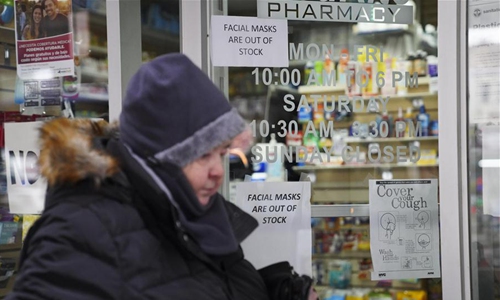HOME >> WORLD
US Senate approves 8.3-bln-USD emergency funding to fight COVID-19
Source:Xinhua Published: 2020/3/6 15:33:13

A notice showing "facial masks are out of stock" is seen on a door of a pharmacy in New York, the United States, Feb. 29, 2020. The Washington State Department of Health confirmed the first death in connection with coronavirus disease 2019 (COVID-19) Saturday as more cases of unknown origin were reported in western U.S. states. (Xinhua/Wang Ying)
The US Senate on Thursday overwhelming passed a 8.3-billion-dollar emergency funding package to respond to the growing cases of the novel coronavirus disease (COVID-19) and mounting public concerns, sending it to President Donald Trump for signature.
The funding bill passed 96-1 in the upper chamber of the US Congress, following a similar bipartisan approval by the House of Representatives a day earlier.
The bill, negotiated by leaders from both Senate and House appropriations panels, will boost funding for the testing of the virus, support the development of vaccines, as well as lower costs for medical treatments.
The funding agreement came as fears of virus spreading are growing among Americans, with US Centers for Disease Control and Prevention reporting 148 cases of COVID-19 as of Thursday, including about 50 cases with no clear source of infection. There have been 11 deaths in the country, 10 in Washington state and one in California.
Senator Richard Shelby, chairman of the Senate Appropriations Committee, said in a statement that the funding packing "includes what our experts say they need."
"It attacks the crisis at the local, state, federal, and international levels," said Shelby, an Alabama Republican. "And it brings to bear the full resources of the federal government."
US House Speaker Nancy Pelosi, a California Democrat, tweeted that the bipartisan coronavirus emergency response package "will give the government the resources to keep Americans safe."
The funding plan is significantly larger than the request from the White House, which initially asked for 2.5 billion dollars to fight the ongoing spread of the disease.
The plan includes nearly 7.8 billion dollars in new funding to combat the spread of the virus at the local, state, national and international levels, and it also authorizes 500 million dollars to allow Medicare beneficiaries to access telehealth programs.
Posted in: AMERICAS